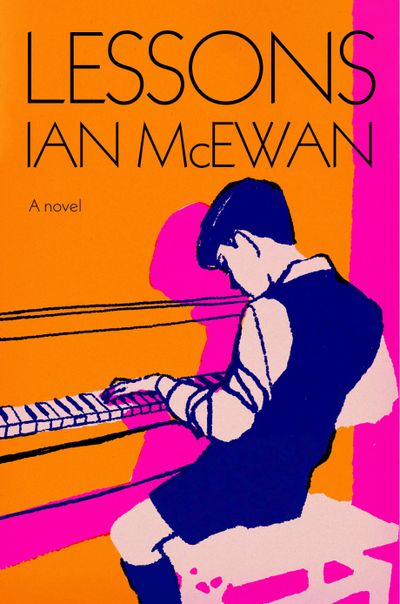Book World: Sexual abuse casts a long shadow in Ian McEwan’s ‘Lessons’

Readers drawn to Ian McEwan’s gorgeous novel “Atonement” 20 years ago may have drifted away from the writer’s bizarre recent work.
His last three books have been minor, fantastical stories, wormy with weird wit. “Nutshell,” for instance, was an homage to “Hamlet” narrated by an imperiled fetus. “Machines Like Me” told the tale of a man cuckolded by a sex robot. And “The Cockroach” squished together Boris Johnson and Gregor Samsa.
It’s safe to come back now.
McEwan’s new novel, “Lessons,” is a profound demonstration of his remarkable skill. While the story shares a few tantalizing similarities with the author’s life, it’s no roman à clef. Instead, it depicts an ordinary man, a failed writer, buffeted by intimate and international crises over the course of more than seven decades. And for an author famously devoted to brevity, “Lessons” is also his longest novel. Here, finally, McEwan – who won the Booker Award in 1998 for “Amsterdam” – luxuriates in all the space he needs to record the mysterious interplay of will and chance, time and memory.
The man at the center of this story is Roland Baines. For many years he presumes to think of himself as a professional poet – or at least a prospective one. We meet him in 1986 soon after his wife, a fellow writer, has vanished, leaving him and their baby son behind. The police suspect foul play, but Roland has no reason to doubt his wife’s explanation. “Don’t try to find me,” she wrote on a note on his pillow. “I love you but this is for good. I’ve been living the wrong life.”
Her sudden disappearance, combined with the exhaustion of caring for a baby and the anxiety of the Chernobyl nuclear plant disaster, pushes Roland’s mind back to an earlier betrayal. When he was a 14-year-old student at an English boarding school, his piano teacher, Miss Miriam Cornell, groomed him, seduced him and kept him in her house as a sex slave. Roland knows, on some level, that the two women – his ex-piano teacher and his errant wife – are not analogous, nor are their actions, but he can’t help blaming them both for warping his life at crucial junctures.
What follows is an extraordinarily deft portrayal of the way a too-early sexual experience permanently stains Roland’s romantic expectations. In his aching memories of those months, we see Miss Cornell’s perverse desires only through a boy’s pride and excitement. To us, she’s a fiend of manipulation, but to young Roland – adrift in a world bracing for nuclear annihilation sparked by Kennedy or Khrushchev – Miss Cornell looks like salvation itself.
When their relationship ends, Roland is burdened with a terrible misimpression of his moral culpability and a fractured sense of his personal efficacy. “It never crossed his mind that her behaviour was depraved, despicable,” McEwan writes, but years later an adult lover sees the impact plainly: “This piano teacher … she rewired your brain.”
All that unresolved psychological damage gets drudged up when Roland’s wife abandons him. Different species of shame remain hopelessly jumbled in his mind, rendering him effectively listless. It doesn’t help that his absent wife attains the literary success he long dreamed of. Worse, she becomes one of Europe’s most famous writers, a perennial candidate for the Nobel Prize, while Roland and his son fade into the footnotes of her biography.
But McEwan never loses track of Roland. “Lessons” progresses in time the way a rising tide takes the beach: a cycle of forward surges and seeping retreats, giving us a clearer and fuller sense of Roland’s life. He remains unattached, unengaged, often unemployed – tragically dedicated to an adolescent fantasy that was never valid to begin with. “How easy it was to drift through an unchosen life,” he thinks.
He becomes a kind of Zelig character passing through momentous changes in the late 20th century. “In settled expansive mood,” McEwan writes, “Roland occasionally reflected on events and accidents, personal and global, minuscule and momentous that had formed and determined his existence. His case was not special – all fates are similarly constituted.”
Indeed, even more than McEwan’s previous novels, “Lessons” is a story that so fully embraces its historical context that it calls into question the synthetic timelessness of much contemporary fiction. Roland may be imaginary, but he’s thickly woven into the social and political developments that shaped all our lives, including the collapse of the Berlin Wall, the rearrangement of Eastern Europe, Margaret Thatcher’s transformation of the British economy and, of course, the coronavirus pandemic.
Roland, clearly channeling the 74-year-old McEwan, thinks it would be “a shame to ruin a good tale by turning it into a lesson.” Looking back over his life, “when he asked himself if he wished none of it had happened he did not have a ready answer.” But from the perspective of old age, the great chain of cause and effect stretches out behind Roland with instructive clarity. A cursed marriage gave him the blessing of a wonderful son; years of loneliness finally led to real happiness. Could any bad stone in the rickety structure of his life have been removed without threatening the whole?
Some readers may feel “Lessons” is too stingy with drama, particularly given the book’s length, but I think it demonstrates the peculiar power of the novel form. There’s something close to divine in this process of creating the entire span of a person’s life embroidered with threads trailing off in every direction. Here is a narrative that moves with such patient dedication into the circuitous details of an ordinary man’s experience that by the end I knew Roland better than I know most of my actual friends.